From R-rated movie to Toys 'R' Us: How Aliens, Terminator and Predator became action figures for kids
Get away from my Ripley doll, you bitch!
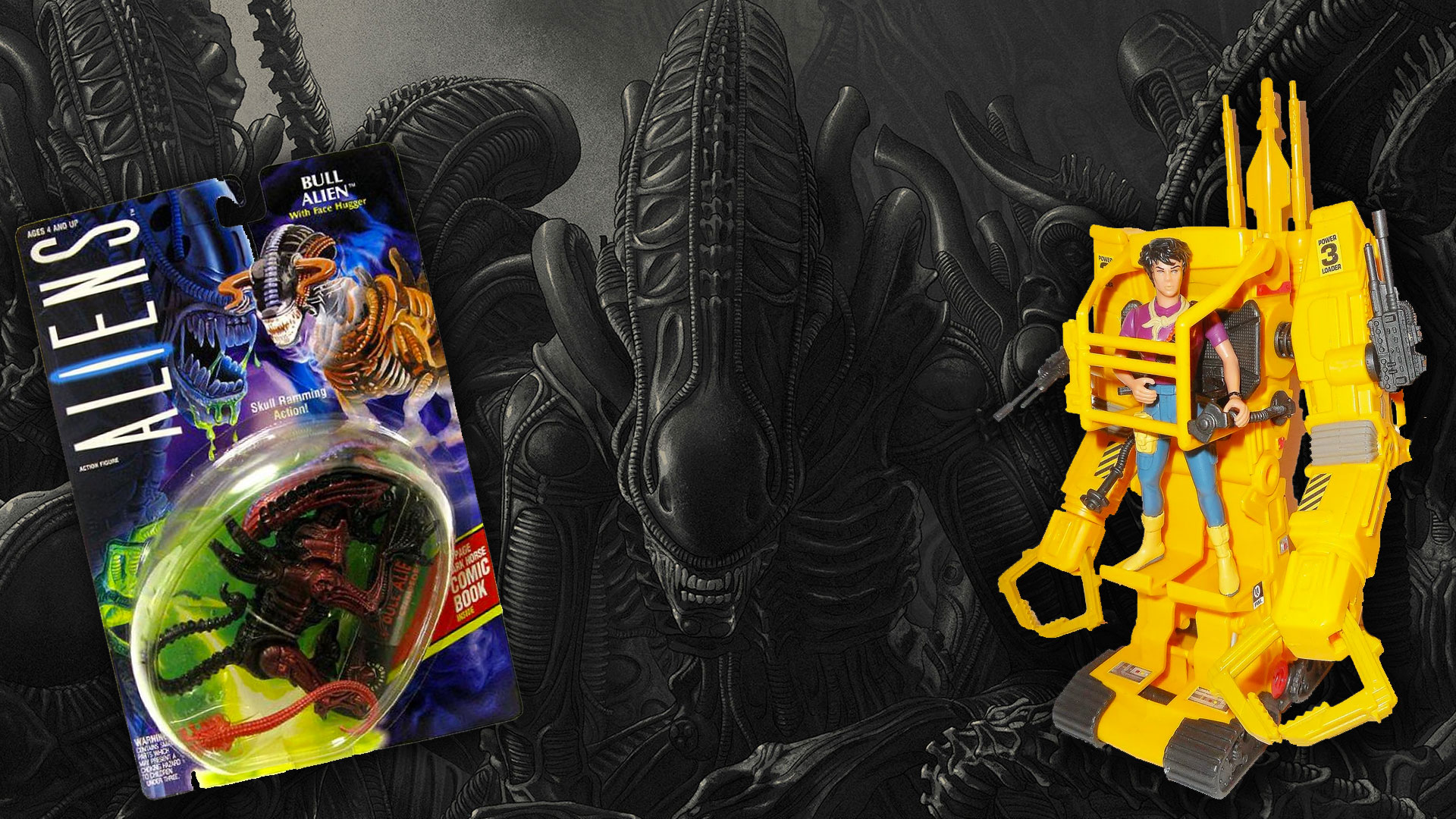
In space no one can hear you scream. But for a short while in the 1990s, they might have heard you in the aisles of your local Toys R Us. The 1990s toy industry briefly indulged a craze that saw some of the most blood-soaked film franchises in Hollywood history become children’s playthings, from Ridley Scott’s Alien to James Cameron’s Terminator, for kids aged 6 and up.
It seems like madness now – you wouldn’t expect to see toys based on Mad Max: Fury Road, or John Wick aimed at kids barely finished with Sesame Street. So how did toys inspired by R-rated movies come to sit on shelves alongside Barbie, Fisher Price and LEGO?
Like many pop culture phenomena, the answer can be traced back to Star Wars. The 1977 flick hadn’t just been a hit for cinemas – it had been a huge win for toymaker Kenner, which had acquired the license, and toy shops too.
The force of Star Wars
Moving from the standard 12-inch doll to a 3.5-inch scale figure for Star Wars had afforded the toy sculptors at Kenner the scope to make not only character models, but the giant ships and sets that were so awe-inspiring on screen to go along with them. It resulted in a huge collectible hit, with children clamouring to grab Luke Skywalker, Chewbacca and the entire collection of figures and spaceships that went along with them.
Star Wars toys quickly became a multi-million dollar business for Kenner, but following 1983’s then ‘final’ Star Wars film, Return of the Jedi, interest in the series had cooled. By the late 1980s, Kenner was hunting for its next big hit.
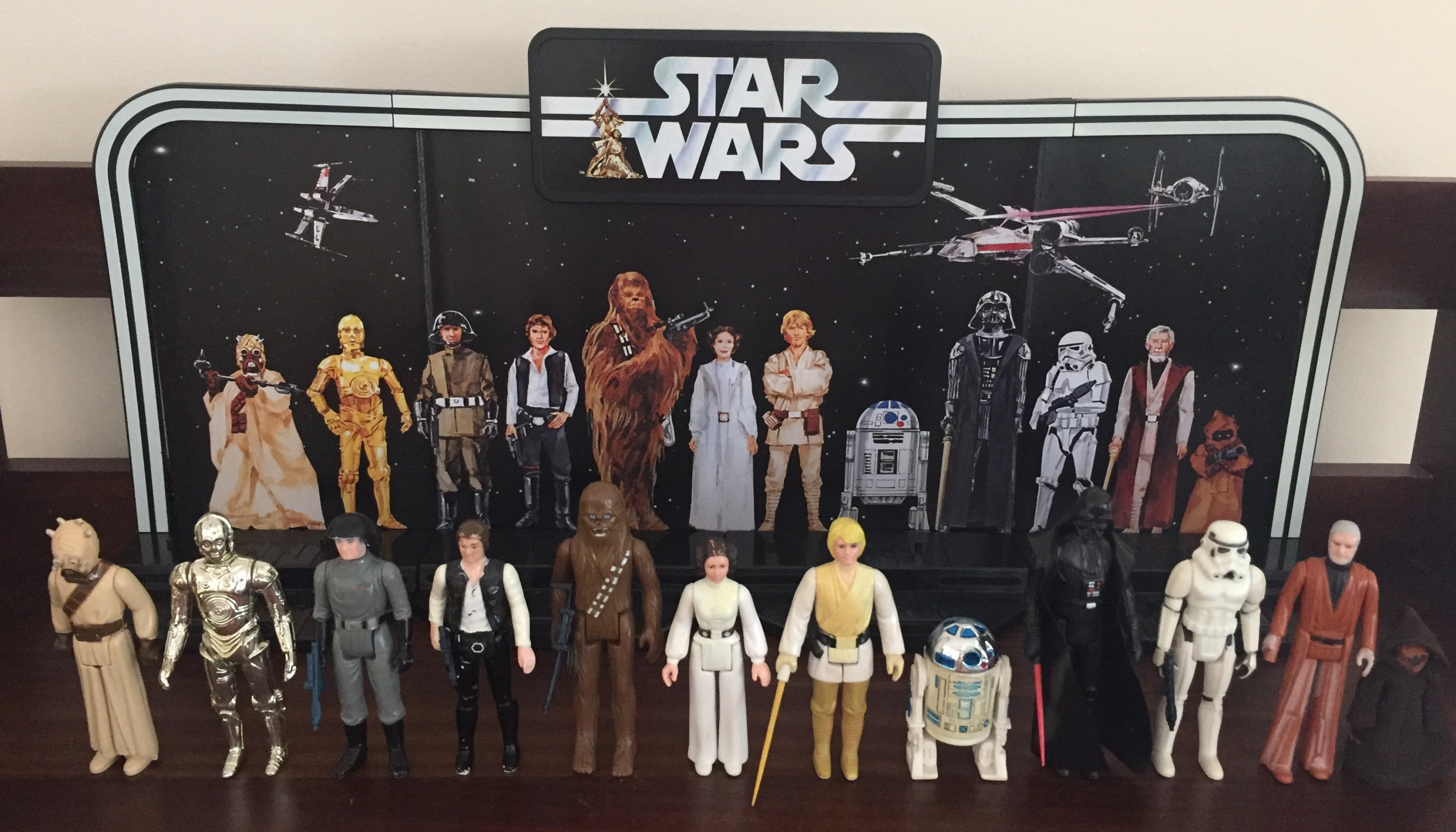
“Kenner wasn’t thinking about the long term,” says Lawrence Elig, speaking to TechRadar from his home in Rhode Island. Elig had worked as a scenery sculptor at Cincinnati's King’s Island theme park before joining Kenner as a toy sculptor at the height of its Star Wars boom period, working on “a couple of Lukes, a couple of Stormtroopers”.
“It was more, they were trying to capitalise on a hit. They just bounced around. They would think: well maybe this is good for one year. After that they're going to be looking for something new. And if you looked at it, most of those lines didn’t last more than one to two years. They weren't looking for Coca-Cola or something.”
Get daily insight, inspiration and deals in your inbox
Sign up for breaking news, reviews, opinion, top tech deals, and more.
“Once the original Kenner Star Wars line became such a hit, every toy company started grabbing movie licenses hoping to score that ‘next big hit,’ adds toy expert Dan Eardley, co-author of The Toys of He-Man and the Masters of the Universe and presenter for top YouTube toy channel, Pixel Dan.
It was quite a creative period in Hollywood. They were turning out great movies all the time (unlike now). All the time there was something new.
Lawrence Elig, Kenner toy sculptor
“I think it took until the late 80s and early 90s for that to really start working more effectively. This was the time when the Summer blockbuster really became a thing. The over-the-top action movies specifically were ripe for the picking when it came to making action figures.”
“For a couple months, you'd be working on Starting Lineup and then you'd switch over to Mask or Swamp Thing, Terminator, The Real Ghostbusters,” says Elig.
“They were just doing all sorts of different lines. It was quite a creative period in Hollywood. They were turning out great movies all the time (unlike now). All the time there was something new.”
The blockbuster franchise was in full force in a way that wouldn’t be seen again until the rise of the Marvel Cinematic Universe. And yet nothing had landed with the same impact that Star Wars had.
But Star Wars hadn’t been the only sci-fi mega hit of the late 1970s. Ridley Scott’s Alien had terrified audiences in 1979, bringing the isolation of space together with the threat of a classic monster flick, and the gruesome eye of biomechanical artist H.R. Giger.
Kenner, naturally, snapped up the rights to make a toy series based on the film but, for some reason, the thought of having a 12-inch doll of an eyeless, phallic insectoid-like creature sitting in kids’ bedrooms at night just didn’t appeal. “They were going to do three and three quarter-inch Alien figures – I saw a few of them, saw the alien,” Elig recalls. “But the large one didn't sell that well so they dropped the line.”
I'll be back: Arnie and the return of the xenomorph
Fast-forward to the early 90s, however, and blockbuster cinema had a new George Lucas on its hands. James Cameron had helmed an Alien sequel, the more action-focused Aliens, hot on the heels of the success of his explosive (and particularly violent) Terminator films. In Terminator leading man Arnold Schwarzenegger, you had a larger-than-life bodybuilder who was essentially a living, breathing action figure, a household name with cross-generational appeal.
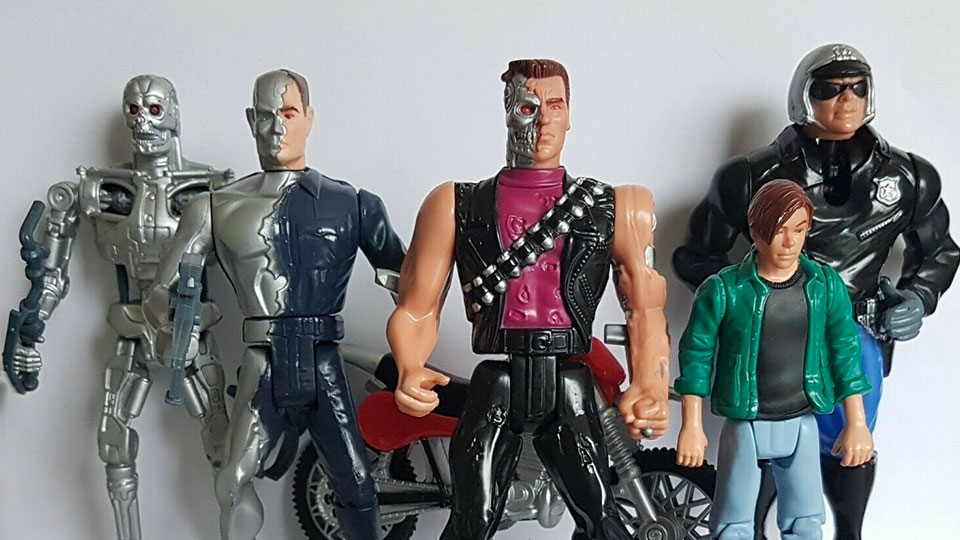
It mattered little that the Terminator’s sole purpose was to wipe out humanity, that he’d punch straight through a street-punk’s chest, or that its sequel featured a scene where a man is skewered up through a carton of milk into his throat by a liquid-metal manhunter. With Schwarzenegger’s face on the box, it was a license to print money.
Cameron’s revitalization of the Alien franchise was ripe for merchandising, too. Aliens saw Sigourney Weaver’s Ripley return with a gang of gun-toting Marines in tow, facing off against not one, but dozens of the xenomorph creatures.
I would always ask: get me to do a monster. I did the Emperor, for Return of the Jedi. So I was always looking for villains or monsters. I always enjoyed that.
Lawrence Elig, Kenner toy sculptor
With vehicles, weapons, mech suits and even a big-bad Alien Queen supervillain featured, the franchise now had all the components needed for a proper toy line. And so in 1992 Kenner got back to work on making an all-new line of Aliens toys.
To make a good toy, “you have to find that hook that makes the toy more than just a cash-in on the latest Summer blockbuster – it’s got to stand on its own, find that fun,” says Eardley. And for the Aliens line, Kenner had the perfect man for the job in the shape of Elig.
“I worked on both 1983 and the 1996 Gamorrean Guard for Star Wars. I did Hammerhead. Worked on the Jabba the Hutt playset with another sculptor. I would always ask: get me to do a monster. I did the Emperor, for Return of the Jedi. So I was always looking for villains or monsters. I always enjoyed that.”
Each Aliens toy, like the Terminator toys that preceded them, had an ‘action feature’ that enhanced play. The Terminator line had included figures where mini-Schwarzenegger’s human head would flip back to reveal his metal cybernetic skeleton, and a T-1000 figure that would explode into pieces at the push of a button. The Aliens line was similarly interactive.
“They were feature oriented so the gorilla had a roto-cast head,” remembers Elig. “You could fill it with water and then the spray would come out and you’d spray it out of the mouth. When you pushed his head, the arms would move. With the ram, the alien’s head would jut out and bash. Each one had unique features.”
The crowning achievements would be a to-scale Power Loader that would fit a Ripley figurine, complete with grabbing claws and a missile launcher, and the Alien Queen’s Hive playset, trapping unsuspecting Marines in goo and featuring the menacing-looking Queen herself, with her parasitic chest-burster progeny in tow.
Giger for kids
“As a kid, I wanted them more than anything,” reminisces Eardley. “I fondly remember seeing the commercials and longing for them. But I was not allowed to have them since they were based on an R-rated franchise.
“But I remember many of my friends having them; bringing them to school or letting me play with them at their house when I was visiting. They were a huge hit with the kids of my generation.
Indeed, despite its cinematic inspiration, the intention wasn’t to horrify children. It “was never,” about gore, explains Elig.
“Not with Aliens. We didn't really set out to make them gory, like where they're ripping arms and legs apart. Occasionally, like on the Alien Queen’s set, we would have in the playset maybe pieces of corpses in there.
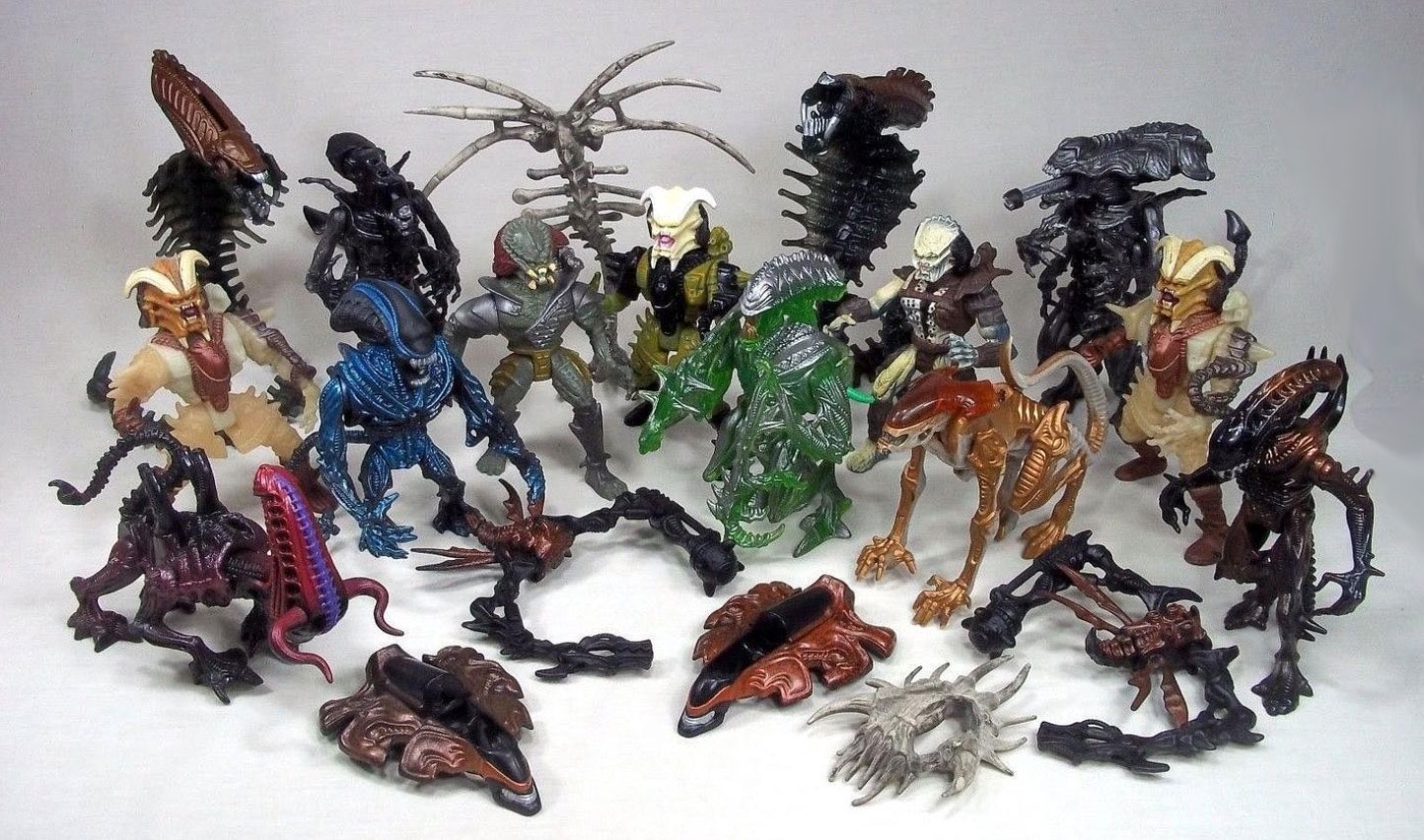
“But most of the time it wasn't like trying to be gory. It was trying to be fearsome and scary. That was fine. The only thing was with the Jurassic Park toys we made, we had Dino Damage. I did T-Rex Junior and you pulled the tag on his side and you see some bones and intestines there. That was about the extent of the gore.”
Instead, Elig and his sculpting coworkers set out to make a diverse line of xenomorph figures, not only following H.R. Giger’s design, but riffing off it too, with cool variants to extend the line’s array of villains.
“The thing that Kenner liked to do was there would be one main alien character but after that they didn't want to repeat them, they wanted each one to be unique,” explains Elig.
“They didn't always like to follow the script of the studio. They liked to be creative in their own way. A lot of these aliens were more like hybrids. Spin-offs of the original character. I remember when we first started doing it, there was a prototype but Kenner used to do a lot of feature-oriented figures.
“So each Alien would be unique. They had the alien traits, you know like the face. But they would let me do like a gorilla alien. So you would have to do a hybrid of a gorilla and an alien combine those, and I did the Ram, the rhino hybrid. And you would just use a combination of the two and come up with something unique.”
“Kenner did a tremendous job of taking what was on screen and adding their own twist to it,” assesses Eardley.
“Instead of a bunch of Xenomorphs that look like each other, we now have green Mantis Aliens, blue Gorilla Aliens, and red Crab Aliens to further the story and keep things exciting.”
The Aliens cartoon that never was
With Alien 3 already in cinemas, the Aliens toy line looked set to be part of a multimedia merchandising blitz for the franchise. But burnt by the lacklustre response to the first Alien toys, Kenner would look to employ a winning tactic proven to drive sales in mega toy lines like He-Man and The Masters of the Universe and Transformers. From R-rated gore fest to Saturday morning kids TV, Aliens was to get a cartoon.
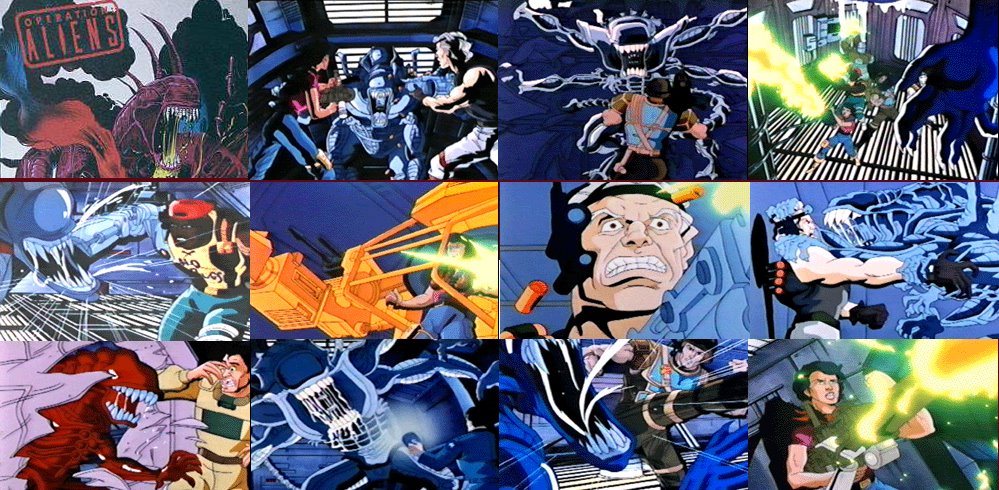
Operation: Aliens, as the show was thought to be called, has become something of legend in hardcore Alien fan circles. That’s because, ultimately, it never got made. There’s much to suggest that the project went far into development – not just snippets of footage, but also merchandising including stationary sets, board games (pictured below) handheld LCD games and even an Alien Queen fancy dress costume, all either prototyped or produced in anticipation of a hit. [A great selection of the proposed Operation: Aliens merchandise can be found archived at Alienscollection.com].
But talks must have stalled early on – even Elig doesn’t recollect its existence. According to former Fox Kids executive Margaret Loesch, speaking to the InternetIsInAmerica blog, 20th Century Fox squashed any hopes of the cartoon being made. Though creative license was given to the toy line, playing with the xenonmorph’s onscreen presence was a step too far.
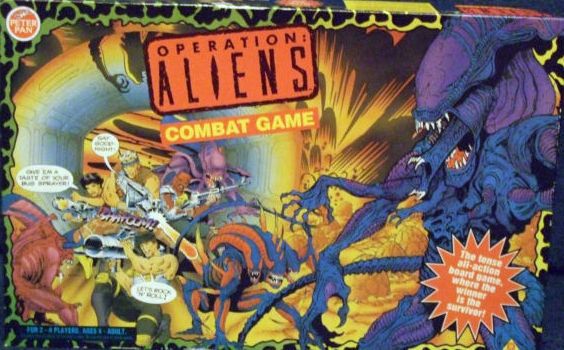
"Because Kenner's prototypes were so creative and because we were all fans of the Aliens movie, our interest was genuine,” Loesch told InternetIsInAmerica.
“But the hurdles were just too high because it was an R-rated property,” she said, citing ”broadcast standards issues”.
“The other factor was that the Fox theatrical division did not want it turned into a 'children's property' at that point in its life."
Wherever the existing footage and concepts come from, it certainly did not come from a Fox pilot. Korean animation giant Nelson Shin has been rumored to have been linked to the project, as was comic book and storyboard artist Will Meugniot. But the claims remain unconfirmed, and neither could be reached for comment for this article.
“With Aliens all we had was the movie. I think it hurt it more than helped not having that cartoon,” concedes Elig.
What did live on, however, was the designs and character work. Not only did they seep into the final look of the human models in the Aliens line, but they also featured as collectible comic books packed in with each toy figure, produced by Dark Horse (which to this day has the rights to the Aliens comic license).
The Dark Horse comics connection would lead to another boon for the R-rated-inspired toy world. Its 1989 Aliens vs Predator comic series had proved incredibly popular, and leant itself magnificently well to toy lines. With built-in crossover potential already existing with Kenner’s Aliens line, an Aliens vs Predator toy line would follow in 1994.
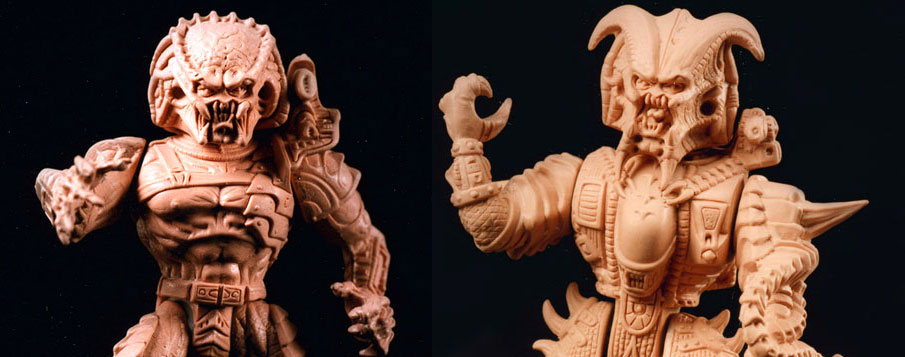
Elig would again be tasked with making a range of unique Predator figures not seen in cinemas, and again to great effect, with the line remembered fondly today.
“Alien and Predator go hand in hand, and have definitely endured the most out of the three [including Terminator],” says Eardley.
Many of Elig’s original toy sculptures and molds are viewable on his website, www.lawrenceelig.com, from Predator through Alien, Jurassic Park and more. The attention to gnarly detail makes it clear to see what made the toys so popular, despite their adult-oriented origins.
Leaving a legacy
It’s many years since the original Aliens, Predator and Terminator Kenner lines stopped hitting toy shelves, but their influence is keenly felt in the toy world today. Adult-focussed toy designs are now big business, having been pioneered by Elig and his peers.
“NECA Toys is certainly the best-known for making toys for all three of these franchises today,” says Eardley.
“NECA has done some amazing things with the properties, focusing primarily on screen accurate action figures based on each of the films, complete with actor likenesses. But the original Kenner toys have had such an impact on our generation, that NECA has even done their own homage pieces to some of those classic Kenner designs!
“The movie comes and goes and life goes on. But Alien and Predator specifically hung on for many years. I attribute that not only to the huge fan base for those properties, but also the creative designs and fun factor of the Kenner figures.”
- The best horror movies: what to watch on Netflix, Amazon and more for a scare
Gerald is Editor-in-Chief of iMore.com. Previously he was the Executive Editor for TechRadar, taking care of the site's home cinema, gaming, smart home, entertainment and audio output. He loves gaming, but don't expect him to play with you unless your console is hooked up to a 4K HDR screen and a 7.1 surround system. Before TechRadar, Gerald was Editor of Gizmodo UK. He is also the author of 'Get Technology: Upgrade Your Future', published by Aurum Press.
